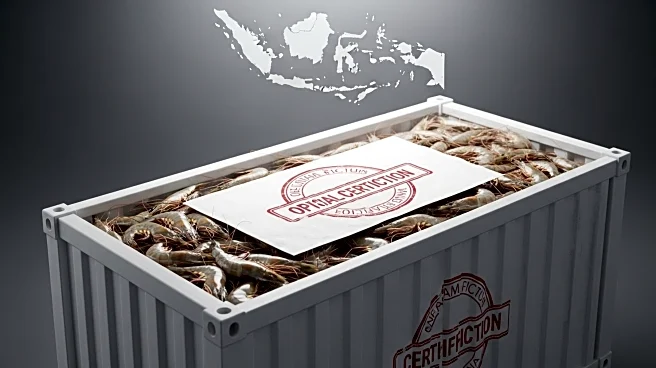What's Happening?
Indonesia has introduced new certification requirements for shrimp exports to the United States after a cesium contamination scare earlier this year. Shrimp producers in Java and Lampung must now provide independent lab test results to Indonesia's Ministry of Marine Affairs and Fisheries (KKP), with additional testing conducted at a national laboratory. This process is mandatory for companies exporting to the U.S. that have not previously encountered cesium issues. Companies with past contamination problems face a more stringent process to meet American standards. Indonesia ranks as the fourth-largest producer of whiteleg shrimp globally. In August, U.S. inspectors discovered cesium contamination in shipments from PT Bahari Makmur Sejati (BMS Foods), which supplies a significant portion of Indonesia's shrimp exports to the U.S. The contamination led to recalls of hundreds of thousands of pounds of shrimp across major U.S. retailers.
Why It's Important?
The new certification requirements are crucial for maintaining the safety and integrity of shrimp exports from Indonesia to the United States. The cesium contamination incident highlights the need for stringent quality control measures to prevent potential health risks to consumers. The contamination, although not immediately dangerous, poses long-term health risks such as cancer with repeated exposure. This situation underscores the importance of robust regulatory frameworks in international trade, particularly for food products. The incident also affects Indonesia's reputation as a major shrimp exporter, necessitating swift action to restore confidence among U.S. consumers and retailers.
What's Next?
Indonesian authorities are conducting an investigation into the source of the cesium contamination, which has been traced to a now-closed steel mill, Peters Metal Technology. The mill's operations involved smelting scrap metal, which is suspected to be the contamination source. A criminal inquiry is underway, and imports of foreign scrap steel and iron have been temporarily suspended pending the establishment of stricter regulations. The outcome of these investigations and regulatory changes will be critical in preventing future contamination incidents and ensuring the safety of exported products.
Beyond the Headlines
The cesium contamination incident raises broader questions about environmental safety and the management of industrial waste. The presence of cesium-137, a byproduct of nuclear reactors, in the shrimp supply chain points to potential lapses in waste management and recycling processes. This situation may prompt a reevaluation of environmental policies and industrial practices in Indonesia, particularly concerning the handling of radioactive materials. Additionally, the incident could lead to increased scrutiny of food safety standards and export regulations, influencing global trade practices.









